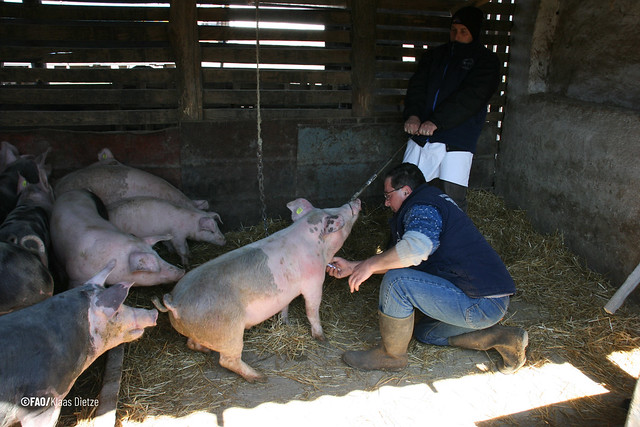
African swine fever
African swine fever (ASF) is a deadly disease of domestic and wild pigs. There is no effective vaccine nor treatment against it.
ASF is not a danger to human health, but it is devasting for the farming economy.Yo can take action to protect your pigs,and your neighbourn's pigs,from this disease.
African swine fever
The African swine fever (ASF) is a serious viral disease that affects domestic and wild pigs. It has been found in more than 50 countries of Africa, Europe and Asia since 2007, and has just reappeared in the Americas.
Although it does not present a risk to human health, currently the ASF is the most serious threat to pig farming on the continent and in the world. Its rapid spread, high mortality and the lack of a vaccine puts at risk the livelihoods of small- and large-scale producers and impacts the market for pig products, thereby causing severe economic losses for the farms affected.
First case in the Americas
The first case of the African swine fever resurgence in the region was discovered in domestic pigs in the Dominican Republic on July 28, 2021.
This is the first confirmed case in the Western Hemisphere since the 1980s.
The disease is now found on every continent of the world. In Africa, Europe, Asia and the Pacific more than 50 countries have already been affected, harming their food security, livelihoods that depend on the pig value chain, and biodiversity, as the disease impacts wildlife.
With the high rate of animal mortality, the disease can strongly affect pig production and also national and international trade of its products.
Necessary measures in response to the outbreak in the Americas
Considering the resurgence in the Dominican Republic, it is recommended that countries of the region:
- Strengthen border controls to prevent the movement of pigs and pig products.
- Increase control of personal belongings from travellers returning from the Dominican Republic. These travellers should not be allowed to visit farms and forests.
- Strengthen biosecurity measures on pig farms.
- In the event of a suspected case, all pigs should be enclosed within their pens, or confined to other areas where it is possible to isolate them.
- Feeding with leftovers should be discouraged.
- Increase surveillance, specifically reporting and testing sick and dead pigs including those feral and free.
- Strengthen sensitization and communication of the risks of the African swine fever to producers, veterinaries, hunters, abattoirs and other stakeholders in the production chain.
10 things that you should know about the African swine fever virus
- It is a deadly disease for pigs.
- It does not affect human beings.
- There is no vaccine.
- There is no treatment.
- It is transmitted by direct contact between sick and healthy animals.
- It could lead to sudden death.
- It can show signs of haemorrhaging in the skin and internal organs, fever and decay.
- Pigs also contract the disease if they consume meat contaminated by the virus.
- Secretions from diseased animals can contaminate belongings, tools, footwear etc.
- Human beings can carry the disease on their footwear, belongings etc.
Publications

Carcass management for small and medium scale livestock farms
2018
Given the spread of different transboundary animal diseases (TADs) such as African Swine fever (ASF), Highly Pathogenic Avian Influenza (HPAI), Foot-and-Mouth Disease (FMD) and Lumpy Skin Disease (LSD), it is pertinent that FAO will provide assistance to countries in a way of practical knowledge on how to deal with animal carcasses.

African swine fever: detection and diagnosis – A manual for veterinarians
2020
Given the current worsening of the African swine fever situation worldwide, this field manual will be aimed to assist veterinarians in the prompt recognition and detection of the disease and the immediate control steps at farm level.

African swine fever in wild boar
2020
The purpose of document is to provide fact based overview of ASF ecology in the Northern and Eastern European populations of wild boar and briefly describe a range of practical management and biosecurity measures or interventions, which can help stockholders in the countries experiencing large scale epidemic of this exotic disease to address the problem in a more coherent, collaborative and comprehensive way.
Photo Gallery

What to do in case of African Swine Fever suspicion
Immediately report any suspicious case to your veterinarian or local veterinary services
Other diseases that could be mistaken as African Swine Fever:
- Classical swine fever (CSF)
- Porcine reproductive and respiratory syndrome(PRRS)
- Erysipelas
- Salmoneollosis (and other bacterial septicemias)
- Aujeszky's disease (or pseudorabies)
- Pasteurellosis
- Poisoning
- Porcine dermatitis and nephropathy syndrome (PDNS)
In the press
- Comisión internacional que verifica peste porcina africana en República Dominicana se comunica con Haití
- La FAO alerta por presencia de peste porcina africana
- OIE, FAO y OMS hacen un llamado internacional para reducir el uso de antibióticos
- La peste porcina africana se convierte en una amenaza para América
- La FAO alerta a los países de América Latina por el primer caso de peste porcina africana en la región
- Alerta la FAO sobre peligro de peste porcina africana en América
- Alerta la FAO riesgo de peste porcina africana detectada en Dominicana
Contact
Ingrid Saravia
Ciudad de Panamá
tel. (503)7207-7458
